



|

|

|
|
2007/08, August Photofictional, A Daily Blog Posting By Bryan Costales
|
|
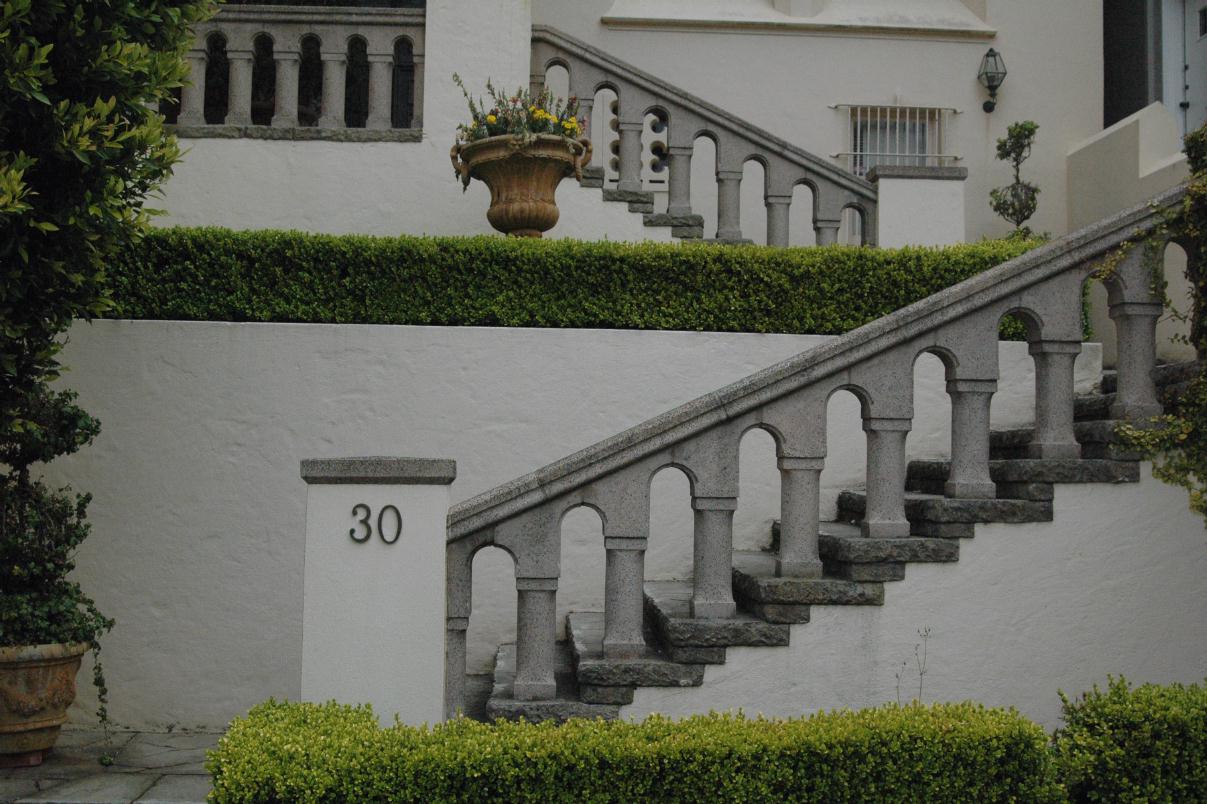 | |
|
Lance Lewis looked at the address and examined the contest
rules once again. Sponsored by Jack's Tires, the goal was to
find the one house in San Francisco whose address exactly matched
its number of steps. The rules defined steps and addresses, and
detailed what was, and was not, a step.
Lance counted the steps with his eyes. Exactly thirty. Lance looked up and down the street. Nobody. He took a photo of the place with his tiny camera, then like a thief, tiptoed up the steps, counting each in an excited whisper. He didn't count the landing, the rules excluded landings from steps. He reached the top and whispered, "Thirty, exactly." Lance looked back down the steps and counted them again with his eyes. Exactly thirty. Lance reviewed the rules again. He had to take a photograph showing the house and hand it to Jack of Jack's Tires on Van Ness Avenue. Lance heard the front door open behind him and turned. An elderly gentleman emerged. The gentleman wore a dinner jacket and slacks and was smoking a bold Mersham pipe. "Evening," said the gentleman. "Evening," said Lance. "You aren't the first," said the gentleman. Lance raised his eyebrows. "Some woman was here about an hour ago. She took a Polaroid of this place then jumped on a scooter and took off." Lance gulped. "I been skunked." "Allow me to introduce myself," the gentleman said with a smile. "I'm Jack Dogeson of Jack's Tires. Why don't you just hand me that little camera." Lance spent his prize paying off his back-alimony. He went on to play in future contests but never won again. Two years later, Lance needed new tires for his car. He took it to Jack's Tires on Van Ness Avenue. Jack was there. "Afternoon," said Jack. "Afternoon," said Lance. "Let me buy you lunch while you wait," said Jack. "Thanks!," said Lance. He smiled. He felt in that moment, as if he had won a prize again. And for his entire life to follow, Lance remembered that lunch as the best lunch he had ever eaten. (2007) Near Union Street, San Francisco, California • Photo Posted Monday, August 13, 2007 • © 2007 Bryan Costales 
 #BP20070813.jpg Add a comment or report a mistake
|
|
|
 | |
|
Once there was a pure white dishtowel, about a meter square.
He hung around all day from the handle of the kitchen fridge lending
a hand when called upon. He was willing to sop up any
spill, even sticky eggs or oil, and did so cheerfully.
One Halloween, the dishtowel began to worry about fraying around the edges. He was pulled from the fridge that afternoon and dropped into a drawer. In his place, hung an orange dishtowel covered with black flying bats. The white dishtowel lay in the drawer and worried for three days. He imagined his life relegated to the drawer of old rags. He examined his frayed edges and wondered if he would be discarded entirely. He tried to express his fears to the doilies in the drawer but, as usual, doilies were too stuck up to reply. Finally, Halloween passed and the white dishtowel was restored to his place on the fridge. But his lesson had been learned. Whenever a hand approached him, he sucked in his frays and tried to appear young and fresh. A Christmas approached, the white dishtowel noticed doilies being replaced around the house with red or green felt squares and circles. A chill ran through him. A week before Christmas he was removed from the fridge and laid on a strange machine. With a whirr and a rat tat tat, his frayed edges were sealed under a decorative edging by a fast moving needle. No sooner was that done, than he was tossed into a vat of boiling liquid. He tumbled in the liquid at a slow simmer for hours and hours. He stayed there through the dark of the night into the dawn of the next day. Finally he was removed and rinsed in cold water, dried in the drier and, at last, hung on the fridge again. The white dishtowel was amazed to find he had been turned into a bright red dishtowel. He flexed his edges and found them unfrayed. He was briefly happy. But then Christmas came and passed and he worried he would be put in the drawer again. But New Years passed and he remained. Spring and then summer came and he remained. Looking around, the bright red dishtowel noticed the kitchen had changed too. Instead of white utilities, like the toaster and mixer, they too were now brightly colored. Instead of metal and white bowls, they too were now brightly colored. The bright red dishtowel relaxed. He was good, he thought, for years to come. But he was mistaken. And, well, that is a story for another day. Berkeley Kite Festival • (2007) Caesar Chaves Park, Berkeley, California • Photo Posted Thursday, August 2, 2007 • © 2007 Bryan Costales 
 #BP20070802.jpg Add a comment or report a mistake
|
|
|
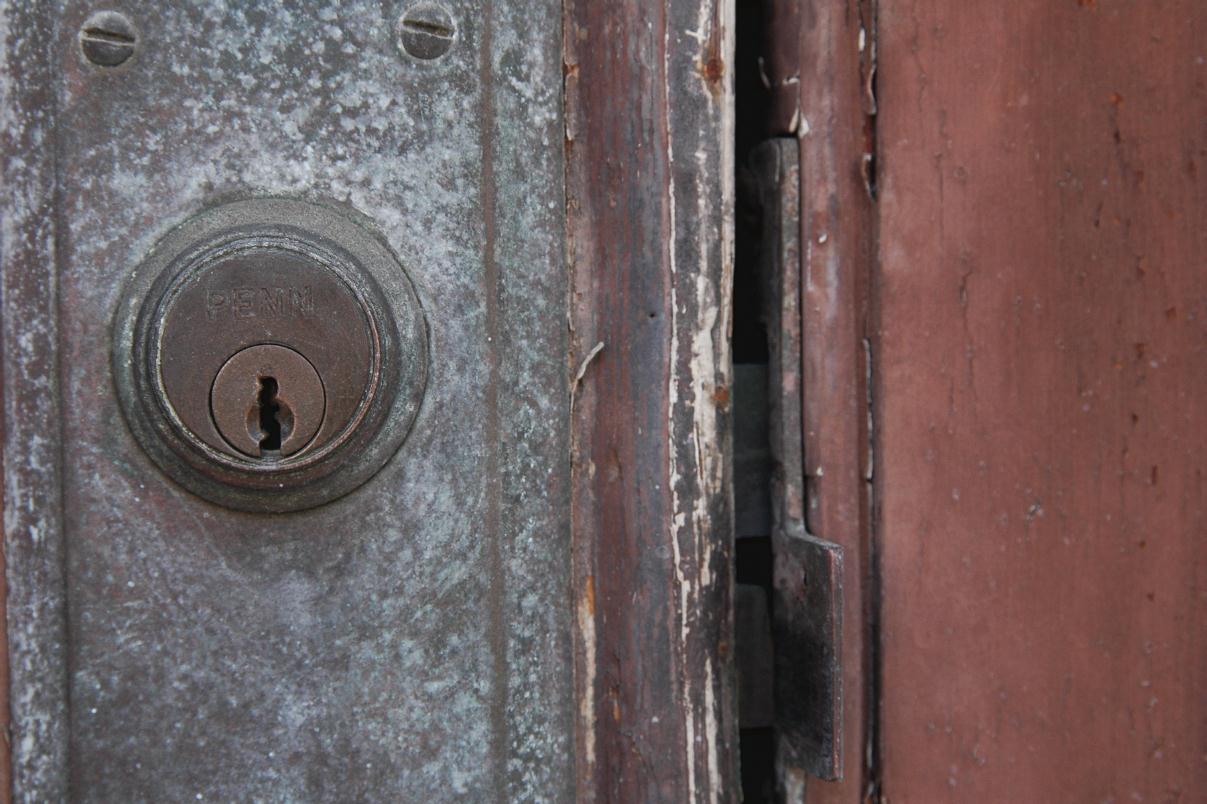 | |
|
We all worry about gaps. Some of us worry is about
the growing gap between rich and poor. During the Cold
War we worried about the Missile Gap and the Bomber Gap.
Otherwise normal children will worry about gaps in teeth. But those same children find it fun to leap a gap. Those that work on cars are used to adjusting the gap in spark plugs. Electronic ignitions have retired the distributor so we no longer need to re-gap the points. The mission of modern schools is to produce consumers. This contributes to the gap between rich and poor, but also allows those consumers to shop at a store named the Gap. In London, when you board the Underground, you are told to, "Mind the gap." In Paris, the word "gap" is never used, perhaps because they speak French. So as tourists we add an "e" and gape at the Museums and Eiffel Tower. In buildings, gaps are often insecure. A gap in a window lets in the burglar. A gap in a door enables a break in. A gap under a door is where you slide that message. A gap in a wall lets in the cold and ants. Gaps are everywhere, some good, but most are bad. Is it any wonder that a lock would worry about its gap? (2007) San Francisco, California • Photo Posted Friday, August 3, 2007 • © 2007 Bryan Costales 
 #BP20070803.jpg Add a comment or report a mistake
|
|
|
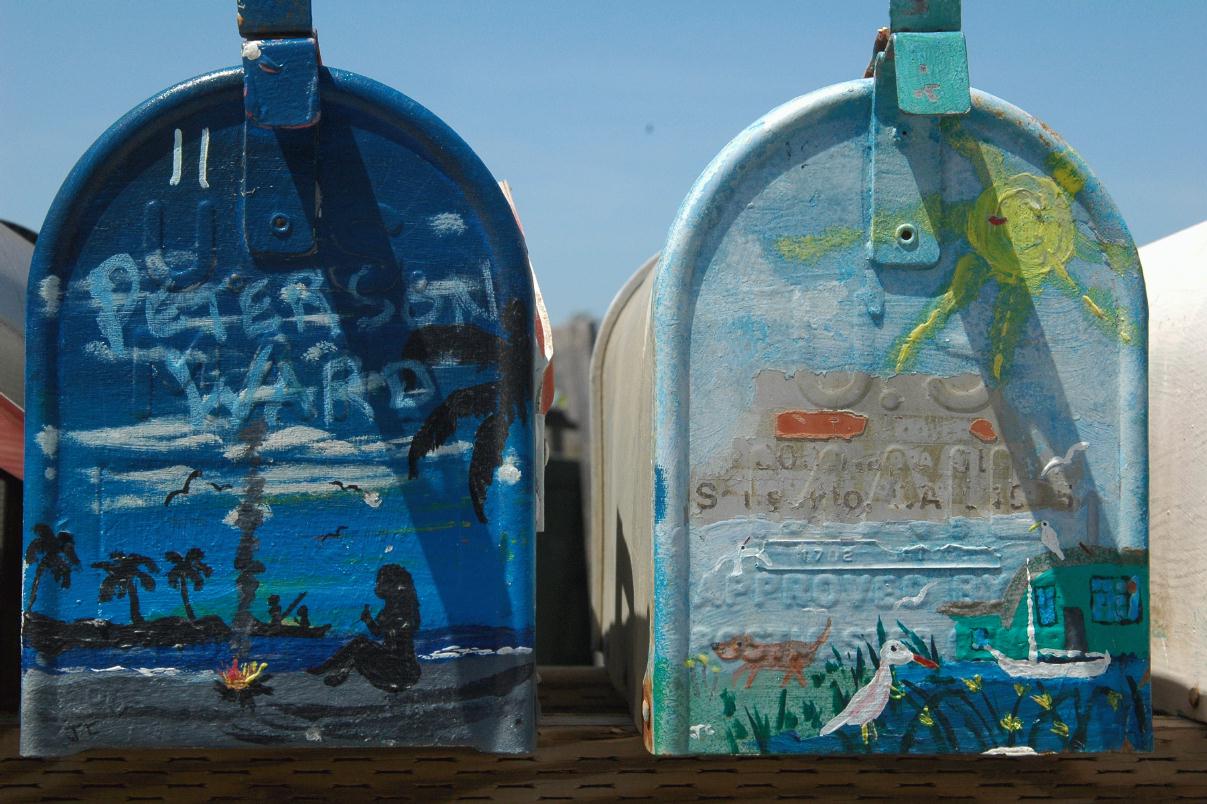 | |
|
Two bland mailboxes rested on a post. They remained mostly
quiet, but would occasionally
discuss the plight of their owners. One was owned by an
poet who worked at home. The other was owned by a woman who
commuted into the city for a dull job.
Because of their peculiar schedules the two owners had never met.
The first mailbox would complain that his owner would only check the mail once per week, and only at 12:01 a.m. Sunday mornings. Inside itself, the first mailbox noticed invitations to awards ceremonies, checks from publishers, and letters of praise for his owners poetry. But seldom was the mailbox's flag up. His owner, the poet, never seemed to answer any mail. The other mailbox lamented her owner who worked every day, and sometimes on weekends. This mailbox suspected her owner had a secret P.O. box because her owner almost never got any mail. A couple times a month her flag would go up, she would be filled with bill payments. But never anything exciting like a letter or a card. The first mailbox got an idea and presented it to the second mailbox. "Hey," he said one sunny morning. "We should get our owners to meet." "I've always thought they should meet too, but what could we possibly do to get them together. My owner doesn't ever get mail here, and yours only checks for mail once a week. "I was originally trained as a mailbox by old-world masters. They believed a mailbox could become something more by the mere power of imagination. I did show you once how I could raise my own flag, didn't I?" "Yeah, but how does that help us?" "Watch," the first mailbox said and then made a sound like a small grunt. On his door, the image of a small fire appeared. "Wow!" said the second mailbox. "How did you do that?" "Imagination." "Let me try." She tried picturing the kind of bird that flew over every day and would sometimes poop on her. From deep inside she felt a strange feeling like a grunt. "Wow!" she said. "I drew a bird!" The two mailboxes took turns imagining and grunting. By evening, they were both fully decorated with scenes of beaches and sailboats. The second mailbox's owner was the first to notice. She looked at her mailbox and the one next to it. She went into her house then came out and put a note into the other mailbox. Sunday morning the first mailbox's owner came out to get his mail. He was surprised to find his mailbox decorated and assumed his neighbor had done it. He took the mail inside and later came out and put a note in the second mailbox. Like that, notes went back and forth for a week. The first mailbox's owner, for the first time, ever, checked his mailbox daily. Then one day the two owners checked mail at the same time and finally met. They chatted there in front of their mailboxes, and to the mailboxes they appeared happy. This, in turn, made the mailboxes happy, and, because they were happy their images never faded, not even after years and years and years. (2007) Sausalito, California • Photo Posted Saturday, August 4, 2007 • © 2007 Bryan Costales 
 #BP20070804.jpg Add a comment or report a mistake
|
|
|
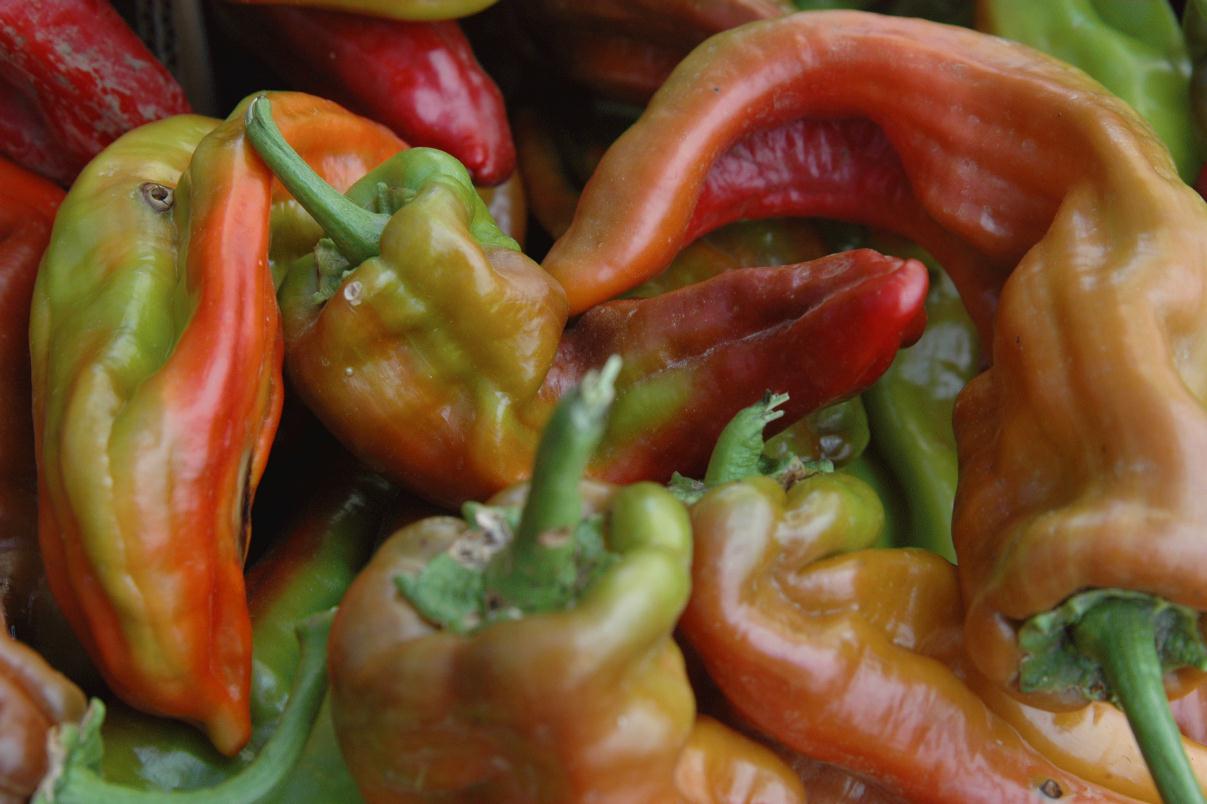 | |
|
Bob stood at the farmers' market that afternoon and stared
down at the empty bin. He liked the farmers' market because
of the good smells and the fresh produce he would sometimes
buy. But there was somthing about that empty bin, on that
particular morning, amid the smells and crowds, that struck
him as very, very abnormal.
Nobody noticed when Bob deconvoluted and landed in the bin as a pile of peppers. Bob stared out with one eye on one pepper that would not blink. He heard the sounds of milling crowds through an ear that was another pepper. Bob felt neither pain nor pleasure from the experience. He had become peppers and merely was. Bob watched as a woman picked through his peppers and asked the booth seller, "Are these peppers hot?" "You're lucky. I thought I had sold out of peppers. No, they are mild." Mild, thought Bob. I become peppers and am mild. What kind of bad luck is that? The woman bought the peppers that were Bob, took them home, and washed them in a collander in the sink. Then she dumped him onto a cutting board and sliced one of his peppers open. Bob watched with his eye, and listened with his ear, as the woman dropped her knife and screamed. She left his vision, and he heard a door slam. Bob wondered what he looked like as a pepper. On the inside that is. Then he thought, Why am I a pepper? And with that thought found himself facing the oddly disquieting empty bin again. Bob blinked then looked up. He asked the booth seller, "What was in this bin?" "Peppers," the booth seller said. "But I sold out an hour ago. You wouldn't have liked them though. I can tell you are a hot pepper kind of a guy." (2007) Farmers' Market, Ferry Building, San Francisco • Photo Posted Sunday, August 5, 2007 • © 2007 Bryan Costales 
 #BP20070805.jpg Add a comment or report a mistake
|
|
|
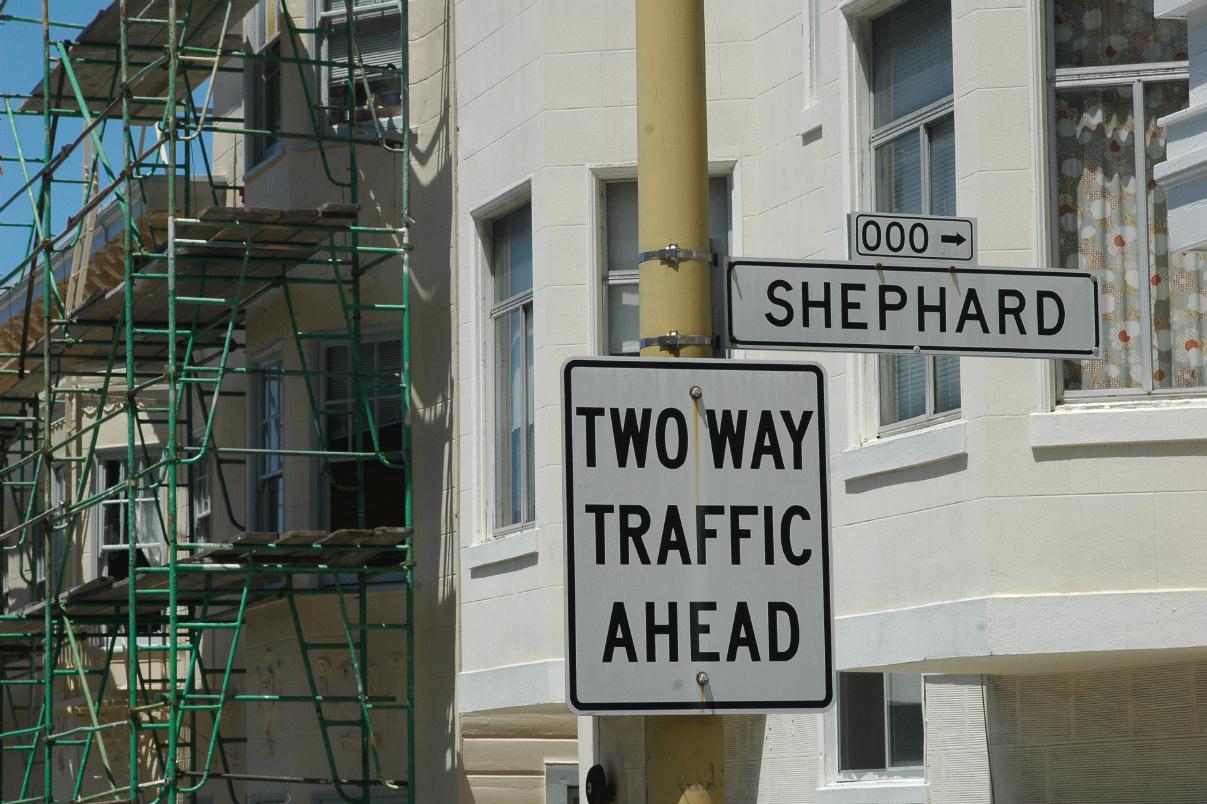 | |
|
Danny read the note again. "Where Shephard begins, wait under the green
ladder." After three false starts he finally figured out that Shephard
was the street. This is the strangest blind date I've ever been on,
he mused. The green scaffolding resembled a green ladder, so he waited
uncomfortably under it.
"Letter for Dan Fields," a loud voice announced next to Danny. Danny looked over his shoulder and found a bicycle delivery person there, holding out a letter. Danny took the letter and peered at the delivery person. "Is that you Bill?" "No." was the gruff reply. The bicycle wobbled then took off down the alley. Danny opened the letter. It contained a key and an address on Bryant Street downtown. "That's the other side of town!" Danny complained out loud to no one in particular. A hour later, Danny walked up Bryant Street with his coat over his shoulder because the fog had burned off. The address turned out to be the front door of an old warehouse with a "For Sale" sign nailed to the front. Inside, Danny found a staircase with hand-drawn signs pointing up. Danny climbed and climbed, all the way to the top. Danny stopped at the landing at the top facing a closed door. He was breathing hard and starting to sweat. "Just great," he muttered. "Now I'll stink." In front of Danny was a note which read, "Use the 2x4 to block the door open or it will lock behind you." Danny went through the door, being careful to block it open, and found himself on the roof. The fog had returned so he put on his coat. In the middle of the roof, Danny found a table with a table cloth, two glasses and a bottle of what appeared to be unlabeled wine. Danny was thirsty from the stairs and a bit pissed off, so he decided it would be okay to have a gulp or two of wine. The wine had a bitter after taste. Danny awoke on the roof with a splitting headache. He was naked and laying on gravel. He felt cold and rain was falling on him. Danny couldn't remember how he came to be there. Danny couldn't remember his name. Danny tried to sit up but couldn't. At this point the narrator walks into view and describes for us the kind of friends Danny never knew he had. The narrator waxes philosophic and bemoans life wasted, and grasping the day. Then, the narrator tells us, "For Danny, a grand adventure is about to begin." (2007) San Francisco, California • Photo Posted Monday, August 6, 2007 • © 2007 Bryan Costales 
 #BP20070806.jpg Add a comment or report a mistake
|
|
|
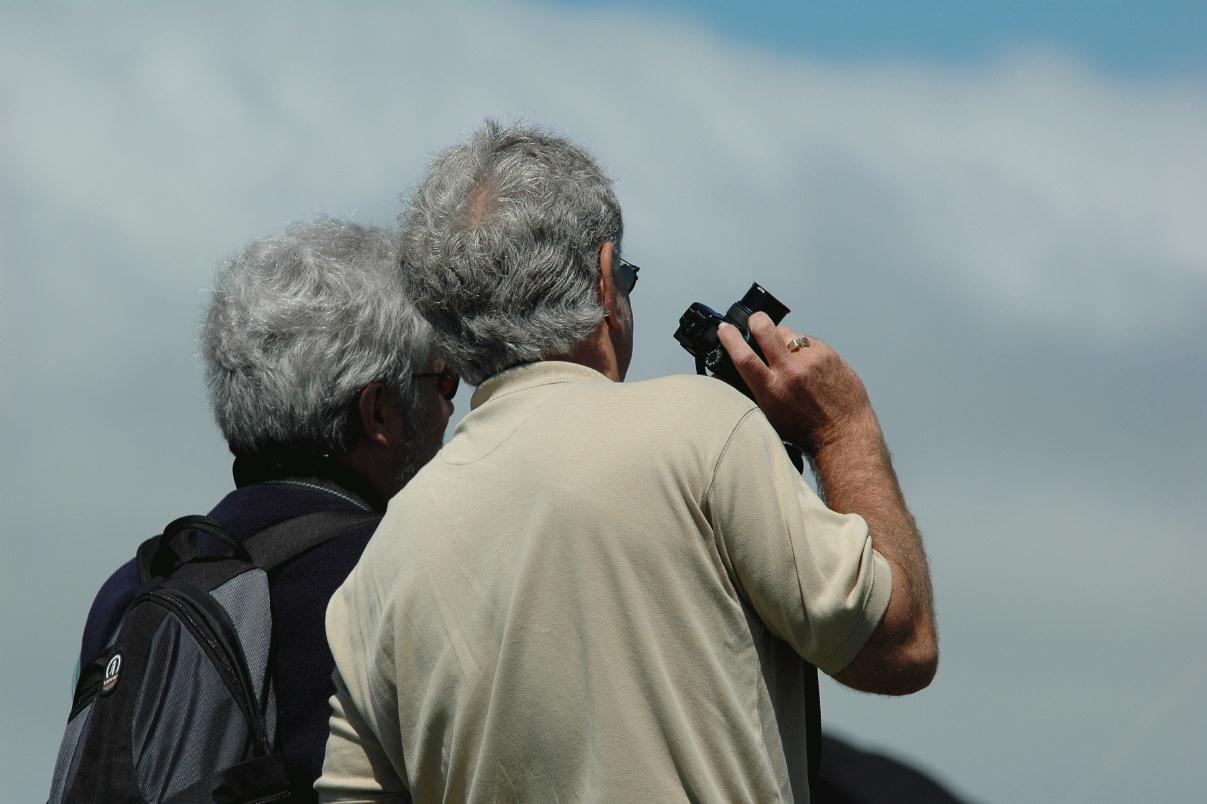 | |
|
Daryl Johnston and Aaron Pelter
considered themselves good looking young
men. They excelled in sports and acted in drama together.
They hung out with the same group and went out on double dates together.
In short, they were best friends.
Then, one day, Daryl discovered photography. Daryl filled his bathroom with chemicals and trays and enlargers and film hangers. He began to smell of chemicals. He began to see light and composition in a way that Aaron couldn't. Their friendship began to fade. Years later, in his forties, Daryl lost track of Aaron. Aaron moved to Florida, married a woman Daryl never new, and worked for the Post Office. Aaron sent a postcard, then nothing. Daryl was in his darkroom when an earthquake hit. Thinking he would be safer under the counter, he squatted and tried to squeeze under it. The earthquake dislodged chemicals in glass bottles which broke. They broke and doused Daryl's eyes, burning both eyes and causing permanent blindness. More years passed and Daryl learned to live his life blind. He used a white cane to get around. He could read braille. He was on a waiting list for a guide dog. And every day, he missed, deep down in his soul, his photography. On his 60th birthday, Daryl was enjoying a birthday grilled cheese sandwich and a slice of apple pie at the Jaxon Restaurant on Cortland Avenue. He just finished his sandwich when he heard someone sit across from him. "Are you Daryl?" the person asked. "Yes. Daryl Johnston. Who are you?" "It's me, Aaron. I wondered what happened to you. I haven't seen you since high school. I had no idea you were blind." "Aaron. Aaron! God, man, its great to hear you again." They talked for hours that afternoon and it turned out that Aaron was now a photographer. To Daryl's surprise, Aaron asked Daryl to join him for the Berkeley Kite Festival that weekend. Sunday afternoon, the fog was just burning back as Aaron led Daryl to a low hill. He lifted his camera and tried to describe what he saw to Daryl. He described the color, the movement of the kites, and the people, so tiny underneath the huge kites. After a while, Daryl began to ask questions. Where was the sunlight? Was light reflecting off the water, off the grass, off the cars in the parking lot? Were shadows hard or soft? Were the kites fast moving and darting or slow and languid? Were the colors primary and saturated or muted? He suggested shots to Aaron, and Aaron shot them. Daryl was a blind professional. Aaron was a gifted old novice. Together they took the occasionally brilliant shot. Daryl didn't care about fame, he only cared about photography. And for a blind man, he began to feel very fortunate. Very fortunate indeed. (2007) Berkeley Kite Festival, Berkeley, California • Photo Posted Tuesday, August 7, 2007 • © 2007 Bryan Costales 
 #BP20070807.jpg Add a comment or report a mistake
|
|
|
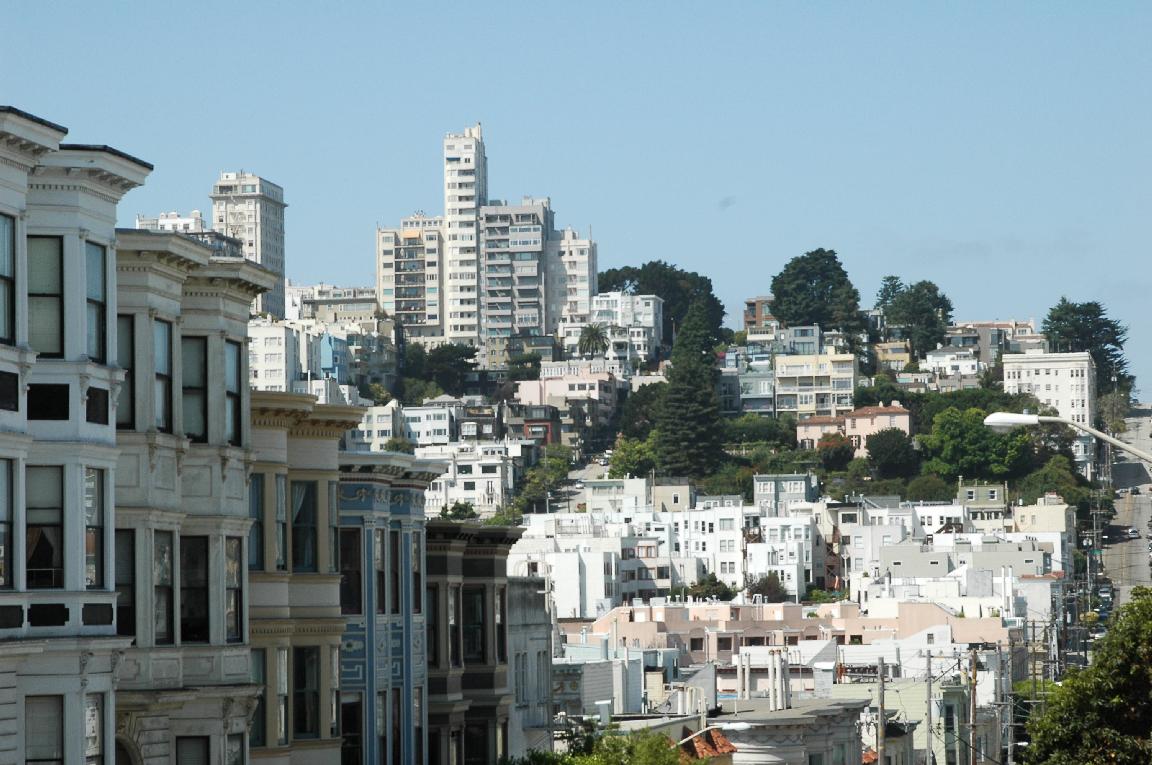 | |
|
Harold Duffs clutched his chest in pain. He felt as if
he had been simultaneously hit front and back by a baseball bat.
Harold looked at his hand on his chest and saw blood.
"Oh my," Harold said. "I think I've been shot."
Harold dropped to his knees and looked at the City before him. He noticed the line of houses to his left. "Edwardians," he said. They reminded him of his first house with his late wife Bess. Only in San Francisco, he thought. In the distance he saw the tall apartment complex where his mother lived before she died. He remembered the convenient walk downhill from the bus and the ham she had baked her last Christmas. Only in San Francisco, he thought and fell to his side. The sidewalk felt hard. In the distance he heard a siren. He thought of his daughter, Anna, now an adult. Harold closed his eyes and faded out. When Harold later awoke in the Hospital his daughter was sitting next to the bed. Her outfit reminded him of the styles he had once seen in France. "What if I had been born in Paris?" he asked her. "You're awake!" His daughter jumped out of the chair and came over to hold his hand. "Dad. I was so worried about you." "If I had been born in Paris," Harold continued as if he had not heard his daughter. "I would have looked at a totally different town when I was shot. I would have seen the Eiffel Tower." His daughter frowned. "What are you talking about dad?" Harold smiled at his daughter. "Nothing," he said. "I'm glad I didn't die. I would have missed you terribly." His daughter laughed, relieved. She squeezed his hand. "If I had been born in Egypt," Harold said. "I would have been looking at Pyramids when I was shot." His daughter nodded because she finally understood. "Or in Africa, looking at Mt. Kilimanjaro." Harold smiled at his daughter again. "Yes," Harold said. Then he thought for a moment. "Only in San Francisco," Harold said. "Only in San Francisco," echoed his daughter. And they both laughed. (2007) North Beach area, San Francisco, California • Photo Posted Wednesday, August 8, 2007 • © 2007 Bryan Costales 
 #BP20070808.jpg Add a comment or report a mistake
|
|
|
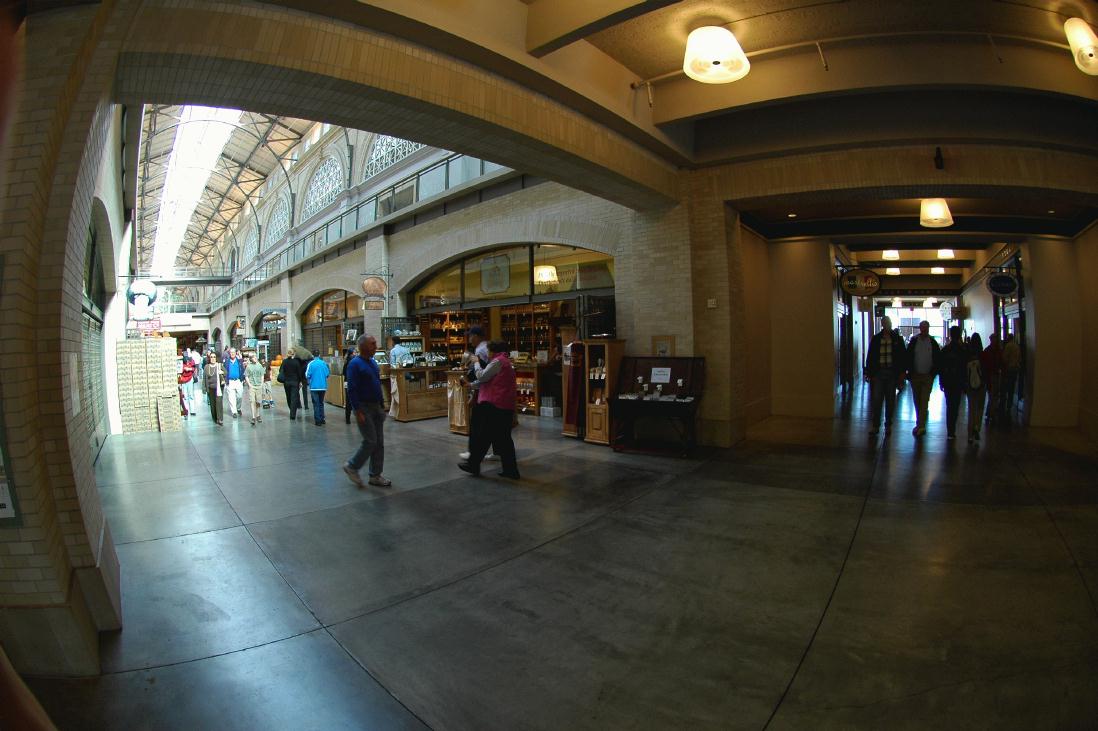 | |
|
Ken Tucker bent over to pick up a quarter when he felt
a hard kick in his butt. He nearly lost his balance
but managed to stay on his feet. Unfortunately the
quarter went sailing out of his hand and dinged
and rolled across the floor.
Where moments before had been a boarded up doorway below the Embarcadero Freeway, now Ken looked up and saw sunshine and crowds of people walking. The quarter rolled between the moving feet and vanished. Ken looked around. He was still outside the Ferry Building but the freeway overhead was gone and in its place was a wide plaza at street level full of people walking and bicycling. Ahead were gleaming glass doors with people streaming in and out of the Ferry Building. Ken followed them inside. The inside was shiny and new and full of wonderful shops. Ken wandered with the crowds and slowly became alarmed by the prices he saw. A sandwich in one place was eight dollars. Ken pulled out his wallet and looked. Ten one dollar bills was all he had. Ken remembered why he had come into San Francisco. He was on his way to protest construction of the new Transamerica building. Ken found himself in front of a booth that sold tickets and maps. He asked the man there, "How do I get to Columbus for the protest?" "You mean the St. Stupid's day parade?" "No, the protest to keep the Transamerica building from being built." The man in the booth looked at Ken like he was crazy. "Man, what are you smoking? The Transamerica building is the icon of the city. Why would anyone in their right mind want to protest anything so beautiful?" Ken remembered that the freeway in front of the Ferry Building was gone. "What year is this?" "I get it. This is an April fool, isn't it?" The man handed Ken a map. "It's free. Now please go away. You're starting to creep me out." Ken took the map outside and looked for a date. He found a tiny copyright 2005 in the corner. "Wow," he said aloud. "40 years." Ken looked around in awe. The foot of Market street he remembered was full of shipping and dark bars and crime. The foot of Market street he now saw was open and sunny and full of people. The freeway was gone and gleaming new buildings lined Market Street. A trolley ran down the Embarcadero and there were white tents with crafts being sold. A quarter fell with a ding by Ken's foot. He looked down. It looked like the same quarter as before. He squatted to pick it up, afraid he might be kicked again. Next to Ken a voice said, "You here for the protest?" Ken looked up and found himself back in his own time. He looked at the quarter. It seemed worth a whole lot more now than it had been worth in the future. Ken flipped the quarter in the air and snatched it. "Yes" said Ken. "It's a waste of time, but let's go protest." (2007) San Francisco, California • Photo Posted Thursday, August 9, 2007 • © 2007 Bryan Costales 
 #BP20070809.jpg Add a comment or report a mistake
|
|
|
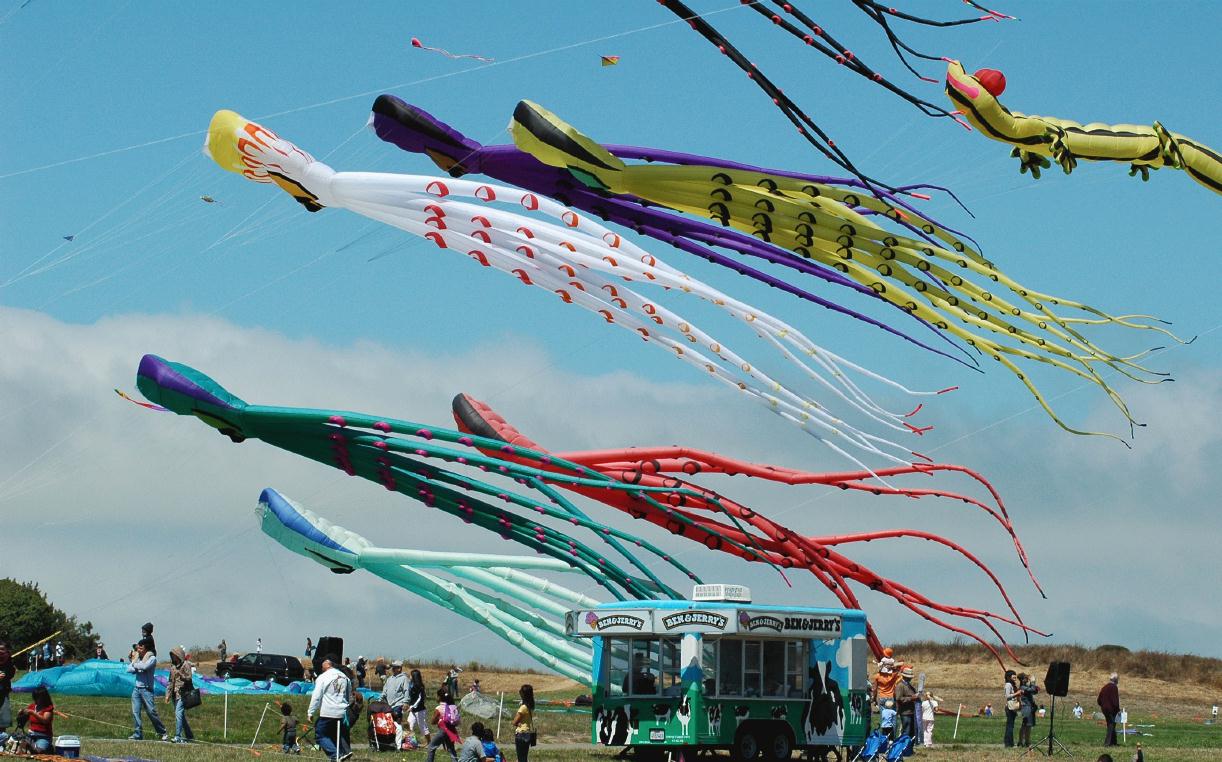 | |
|
Berkeley is located almost due east of the Golden Gate. During
summer and autumn months the Central Valley heats sooner and becomes warmer
than does the coast. The effect is a lower air pressure inland which
causes wind to flow from the coast toward the interior. This
west-to-east air flow is always expected and may be counted upon.
As a consequence,
Berkeley hosts its Kite Festival on a small peninsula exposed
to this wind.
The festival is next to the Berkeley Marina. People with boats dislike this wind because it puts the marina on a lee shore. A lee shore is bad because the wind will drive a boat into the rocks if the boat's sails and motor were to fail. Another drawback to a lee shore is that boats must tack, sailing back and forth in a zig-zag into the wind, to get out into the bay. A wind that blows a constant direction can lead to unexpected effects. The Wright Brothers, for example, built permanent launch platforms to launch into the wind. The platforms could be permanent because the the direction of the wind was constant. On Sunday, October 20, 1991, the talk at the Berkeley Marina was of the odd wind that morning. Instead of blowing from the west to the east as was usual, it was blowing the other way. A warm wind was blowing from the interior in the east, outward toward the ocean in the west. Earlier that same morning, a small fire was almost under control east of the Oakland Hills. The fire was supposed to flow uphill to the natural firebreak of the road. The direction was the same as the expected direction of the wind (a constant west to east flow). At the Berkeley Marina the first sign of trouble occurred when the morning sunshine turned from yellow to brown. All eyes turned to the sky and saw a huge cloud of smoke rising from the Oakland Hills. The Oakland Hills fire of 1991 had begun. When it finished the next morning, 2,843 homes had been destroyed. Things that are constant lead to assumptions. If the wind always blows from one direction, the assumption is that it will always blow from that direction. That assumption lead to a mishandling of the small fire, that resulted in the Oakland Hills fire. Assumptions can be dangerous. One may reasonably ask, what assumption will lead to the next disaster? Berkeley Kite Festival • (2007) Caesar Chavez Park, Berkeley, California • Photo Posted Wednesday, August 1, 2007 • © 2007 Bryan Costales 
 #BP20070801.jpg Add a comment or report a mistake
|
|
|
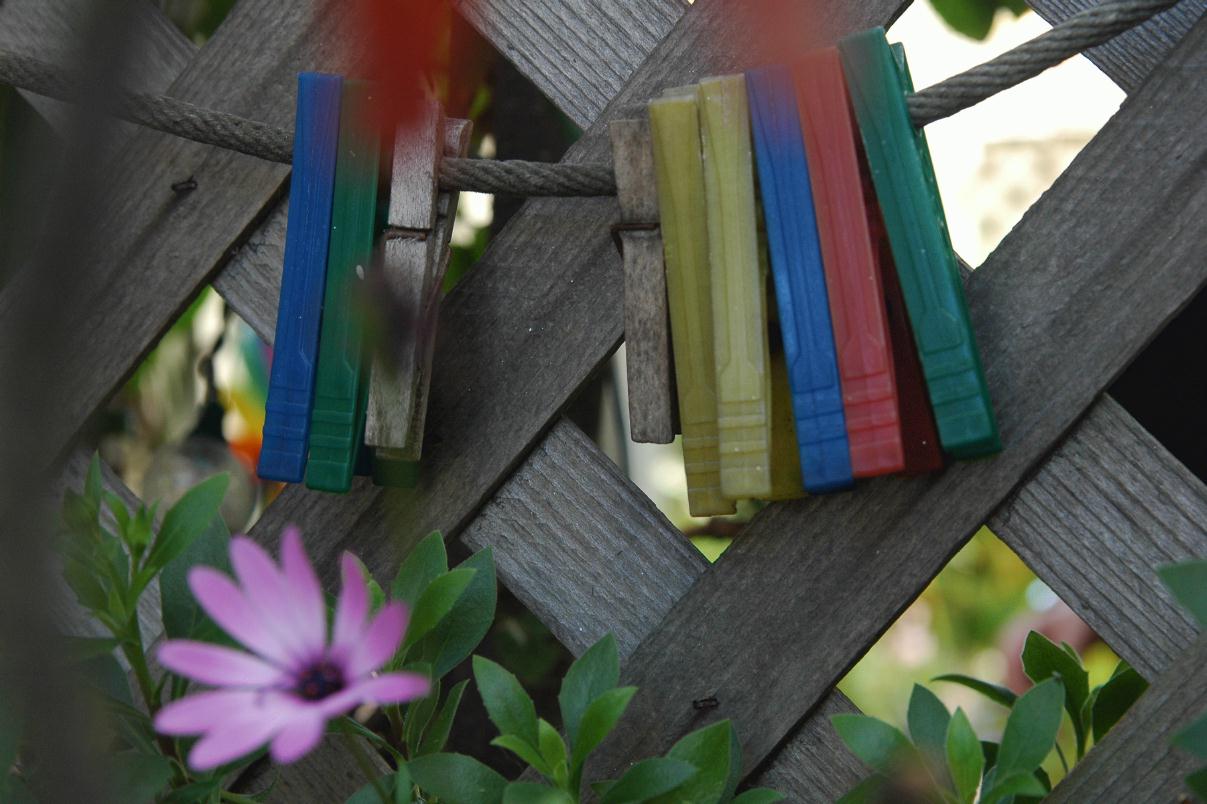 | |
|
Two old wooden clothes pins liked to hang out in the
shade all day. They talked about the old days.
"I recall that sunny afternoon in the back yard. A fresh sheet, I tell you, the softest most white thing you'd ever see." "You remember the rain of 86? I thought we'd be stuck in that box in the closet forever." One afternoon, five young clothes pins joined them on the line. The youngsters were plastic and brightly colored. "Look at the old guys," Yellow said with a hint of disdain in his voice. Dark Blue sniffed. "These old guys smell funny. Like mold or something." The two old clothes pins remained quiet. They'd been through such ragging before and they knew it was best to just remain mute. A flower stuck her head up and tisk, tisked the colored clothes pins. "You youngsters should know better. These old guys were made from trees. They were once alive like me. You youngsters don't know anything, do you. You are all made from plastic." Red bristled with irritation. "We're plastic and we're proud of it. We will last forever." A human hand appeared and snatched up all the clothes pins, leaving the flower alone. The two wooden clothes pins were attached to the wall above the stove and used for years after to hold recipes. The plastic clothes pins were dropped into a blue bin labeled "Recycle." The were melted down and became part of a million plastic grocery sacks. Much later they became part of a road in the valley. And true to their word, although they were no longer around to appreciate it, they did last forever. (2007) Hayes Valley, San Francisco, California • Photo Posted Tuesday, August 14, 2007 • © 2007 Bryan Costales 
 #BP20070814.jpg Add a comment or report a mistake
|
|
|
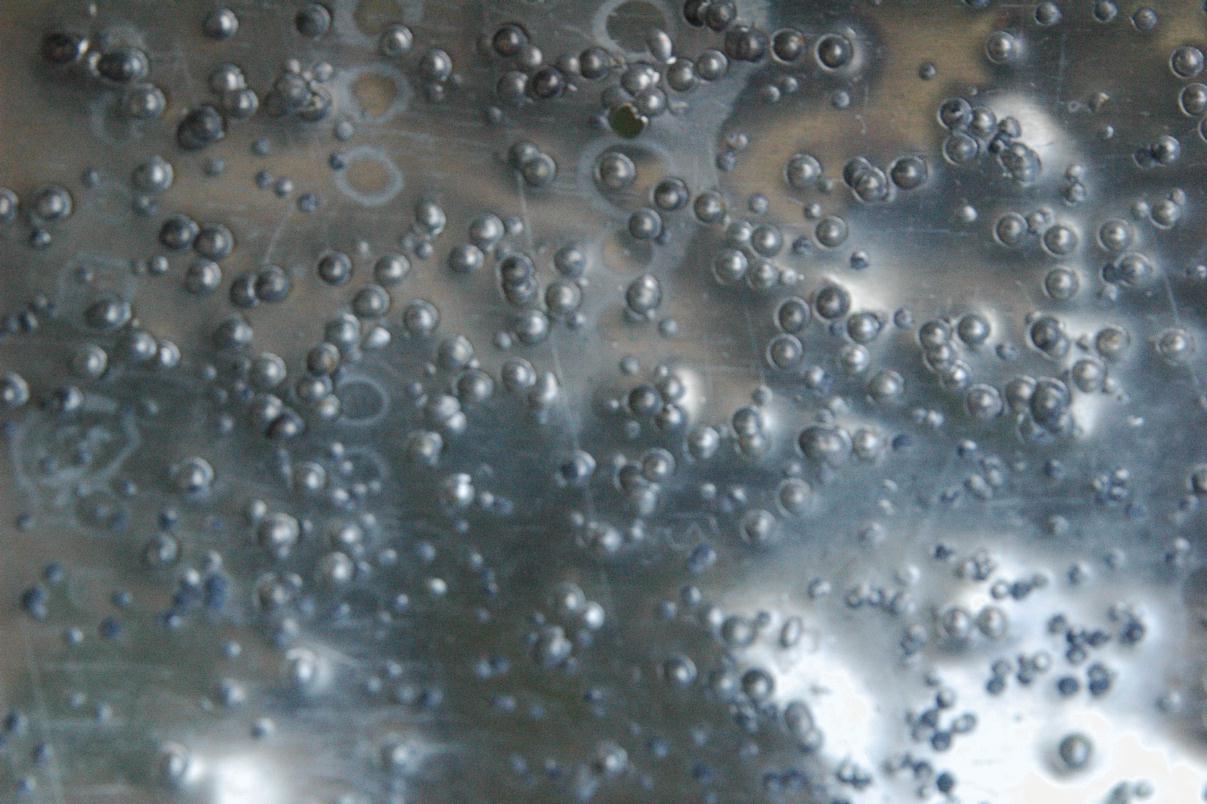 | |
|
Sammy Squirrel had been bitten by a flea the week before and
now felt loopy and friendly. So when a bunch of human campers
arrived, Sammy felt, oddly, that he should welcome them.
Sammy found a pine cone and feverishly worked on it. He pulled out pine nuts and ate them, then remembered what he was doing and refrained from eating one pine nut. Clutching it carefully in his mouth, Sammy loped off to find the campers. "Oh, look at the cute squirrel," one of the campers said. Sammy didn't understand, but sensed a lack of fear. Sammy boldly approached an outstretched hand, saw a nut there, and that nut smelled good but he ignored it. Sammy dropped the pine nut into the hand, then sat back to watch, curious. "That squirrel is sick! Get away from it." The hand was withdrawn and the air filled with a loud call from the camper's mouth. "Get the guns." Sammy waited, fascinated by the campers' movements. It made no sense to him, and he didn't care. The ground exploded under Sammy's feet. Suddenly afraid, Sammy ran. He darted this way and that, leapt from tree to tree, and darted across the wide black road. Sammy hid behind a rock that was really a human road sign. The rock shook and dimpled inward loudly. Sammy leaped off the road and into a creek-bed. He ran up under a boulder and hid in a crack. After a while the campers went away and Sammy slept. He slept all day and all night, and awoke confused. Sammy didn't remember how he got there. Sammy didn't remember the campers. Sammy, after all, was just a sick squirrel. (2007) Capp's Crossing Campground, California • Photo Posted Wednesday, August 15, 2007 • © 2007 Bryan Costales 
 #BP20070815.jpg Add a comment or report a mistake
|
|
|
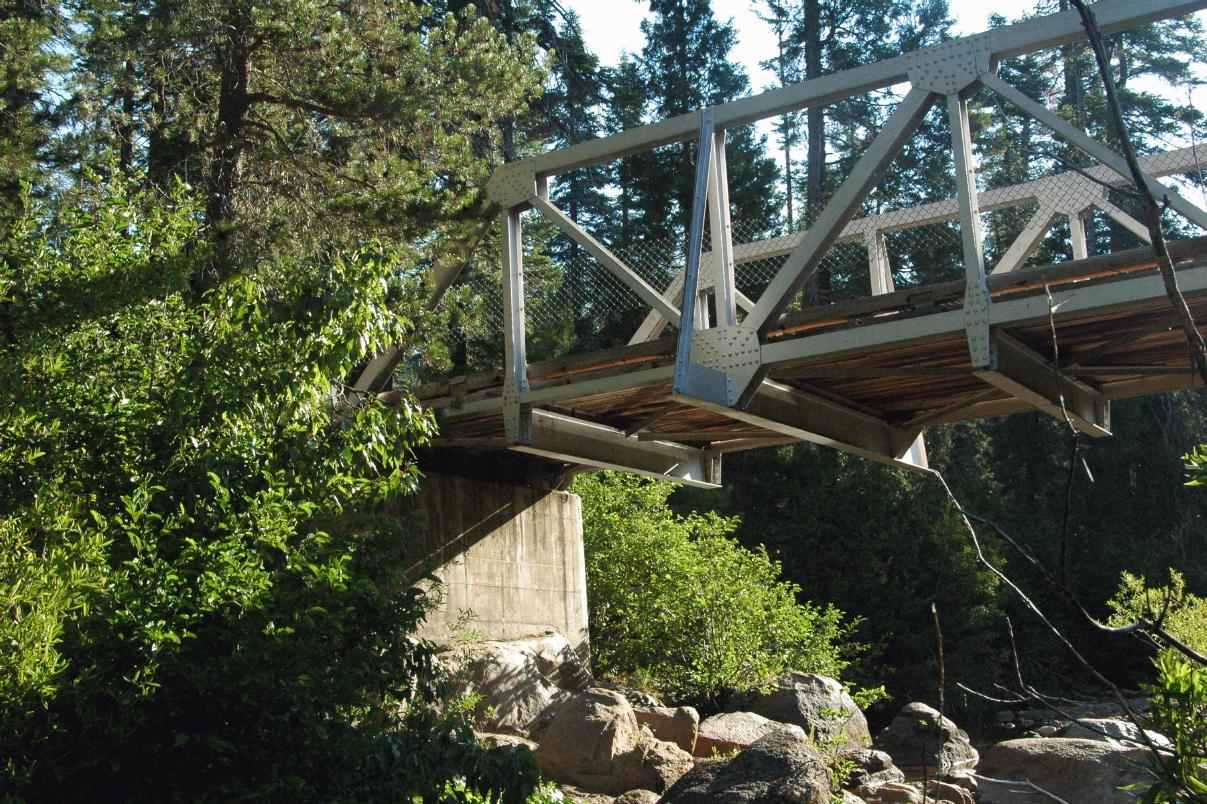 | |
|
"Look," whispered Nick into Al's ear. "Up there.
Under the bridge. Do you see it?"
Al removed his sunglasses and put them on his hat. It was hot that morning, walking in the creaked. His feet hurt and he was beginning to think Nick was a liar. All peered at the bridge. "Where? I don't see a thing." Nick walked forward toward the bridge, "Don't you see it?" Al was irritated. Nick had a habit off walking off while talking with his back to him. Al hurried to catch up and stepped wrong. He felt his left foot bend sideways and a sharp pain shot up his leg. Al called to Nick, "Hold on. I think I twisted my ankle." Nick looked back at him with a frown. "No time. There are only seconds left." Al eased himself to a boulder to remove all weight from his left foot. Sadly, he watched Nick hurry away to stand directly under the bridge. Nick vanished with a small pop sound. Al whistled. "I didn't believe him and just look at that." Al tested his foot and decided he could make it up to the road. Then he thought better and just sat there. He leaned back and enjoyed the sunshine. He remembered being drunk the night before and how Nick came into camp and said he was an alien. "Come with me," Nick said. "I'll take you to my planet at a distant star." Al felt a hangover creeping around his eyes. He tested his foot again, then, easing up on it, started up the incline. (2007) Capp's Crossing Footbridge, California • Photo Posted Thusday, August 16, 2007 • © 2007 Bryan Costales 
 #BP20070816.jpg Add a comment or report a mistake
|
|
 |
| home • contact • topic guide • top 25 • photos • video • writing • blogs • upload • terms • privacy |